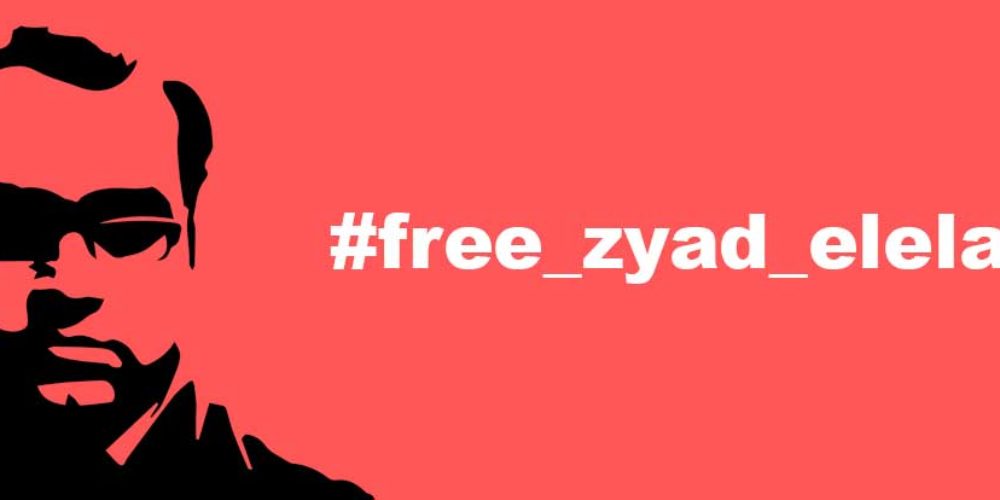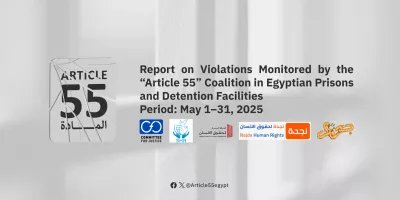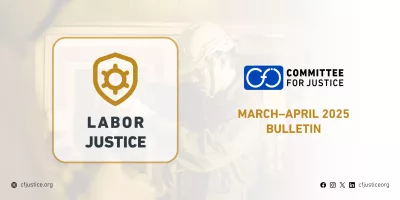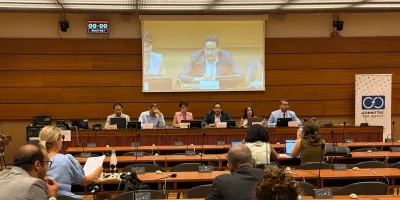After a request from the Committee for Justice, the United Nations Working Group on Arbitrary Detention issued an opinion on the arrest of two members of the “Coalition of Hope” in Egypt, Mr Zyad el-Elaimy and Ms. Louaya Sabry Al-Shahat Abdel Halim, and considered their detention as arbitrary. The opinion is the result of the UN communications team at CFJ, which seeks to utilise UN mechanisms to unveil the truth about human rights violations in Egypt and hold those responsible to account.
The opinion issued at the 92nd session of the Working Group, which was held from November 15 to 23, 2021, reviewed the violations suffered by Elaimy and Louaya in the case known as the “Alliance of Hope case”, which took its name from the Coalition of Hope, a new civil society association through which a number of former parliamentarians, journalists, businesspeople, youth leaders, human rights defenders and labor rights activists in Egypt tried to participate in the Egyptian parliamentary elections 2020.
The Working Group noted that, based on the complaint submitted by CFJ, more than 83 people have been charged with terrorism-related charges, not only members of the Hope Coalition. A large number of the accused in this case were civilians who were not part of the coalition, nor did they have any political activities. This shows the widespread campaign by Egyptian authorities against any opposition and against their citizens in general in an attempt to sow fear and prevent human rights groups and citizens from exercising their rights and freedoms, in the hope of bringing about change in their country.
“Arbitrary detention practices are endemic in Egypt, utilized to further suffocate civil and political space and facilitate other grave human rights violations,” Yasmine Omar, human rights lawyer and UN and regional mechanisms officer at CFJ, said.
“Therefore, it is vital to employ all remedy mechanisms to urge the Egyptian state to halt the practice and release thousands of rights detainees.”
“CFJ values the opinion of the UN working group on arbitrary detention, and hopes it is a call for the international community to stand in solidarity with Mr. el Elaimy and Ms. Louaya Al Shahahat and the Egyptian government to adhere to its international human rights legal obligations,” Omar added.
The opinion addressed what happened with the activist and former member of the House of Representatives, Elaimy, who was arrested on June 25, 2019. He appeared before the Supreme State Security Prosecution on the same day, and was accused of joining a terrorist group and spreading false news. The prosecution ordered his detention pending trial. He was held in Tora prison for 15 days, then his detention was renewed periodically. On July 2, 2019, a decision was issued to freeze his financial assets and ban him from traveling. In January 2020, he was added to another case, and the Mokattam Misdemeanor Court issued a sentence of one year in prison and a fine of 20,000 Egyptian pounds ($1,100), on March 10, 2020. A criminal court also added him, along with 12 other detainees, to the country’s terrorism list for a period of 5 years, on April 17, 2020.
The opinion stated that Elaimy’s health has seriously deteriorated since the beginning of his detention, as he suffers from blood pressure disorder, asthma and stomach ulcers, in addition to a rare autoimmune disease that requires treatment. He was also held in inhumane conditions, in a damp, poorly ventilated small cell, and in unsanitary facilities. He was also denied his right to contact or meet with his lawyer. the lawyer was not allowed to visit him in prison, nor was his defense allowed to see copies of the arrest report, the file of investigations conducted by the security services, any written copy of the charges, or any official legal documents related to him.
Between March 10, 2020, and August 22, 2020, Elaimy was barred from receiving visits on the pretext of the spread of Covid-19, and it was reported that all prison visits throughout Egypt were banned. Elaimy was barred from family visits and communicating with them via phone calls or written messages. Although the ban on prison visits was lifted on August 22, 2020, they were occasional and under difficult and degrading conditions.
Concerning Louaya Abdel Halim, a 26-year-old Egyptian citizen, she was arrested on June 24, 2019, and brought before the State Security Prosecution after 5 days of enforced disappearance. On June 29, she was charged with joining and financing a terrorist group, and possession of political publications. On February 8, 2021, she was ordered to be released, but the next day she appeared again before the Supreme State Security Prosecution, which charged her in a new case with organizing a secret cell from inside the prison and communicating with the leaders of a foreign terrorist group.
The UN opinion clarified that Abdel Halim suffered during her enforced disappearance from incommunicado detention and threats of beatings and electric shocks. She is also being held in inhumane conditions in a small, crowded cell, full of insects and lacking ventilation. She was denied the right to meet or contact her lawyer, and did not see her family until 21 days after her arrest, and she is not allowed to exchange messages with them or talk with other detainees.
In its opinion, the Working Group stated that it did not receive a response from the Egyptian authorities about the allegations contained in the CFJ complaint. The authorities in Egypt did not request an extension of the deadline granted to them to respond, so the team issued its opinion based on what was stated in the organization’s complaint, which was ignored by the authorities in Egypt.
The Working Group concluded that the detention of Elaimy and Abdel Halim lacked a legal basis, and therefore was arbitrary and falls into the first category, as they were arrested without presenting any arrest warrant or providing any legal explanation for the reasons for their arrest, in violation of their right to freedom, as well as the enforced disappearance of Abdel Halim for 5 days, which constitutes a very serious form of arbitrary detention.
The team also considered that the deprivation of liberty of Elaimy and Abdel Halim was motivated by the government’s intention to prevent freedom of expression and the right to participate in public affairs, which are protected by the Universal Declaration and the Covenant, and fall within the second category of violations.
The team considered that, given its findings to the effect that the detention of Elaimy and Abdel Halim was arbitrary within the framework of the first category, the team found that there was a complete or partial lack of respect for the international standards related to the right to a fair trial, stipulated in the Universal Declaration and the relevant international instruments accepted by the concerned states. There have also been multiple violations of international norms relating to the right to a fair trial, to the point that detention is arbitrary under Category III.
In its opinion, the group added that although the source – CFJ – did not make allegations that the detention of Elaimy and Abdel Halim also constituted a category 5 violation. However, the Working Group made its assessment of the facts presented, and zyad found that they were targeted because of their peaceful activities in the context of exercising their freedom of expression and association, and their right to participate in the management of their country’s affairs within the framework of the “Coalition of Hope” which required joining with other activists to criticize the State. This means that their deprivation of liberty violated Articles 2 and 7 of the Universal Declaration, Articles 2 (1) and 26 of the Covenant, and was arbitrary according to the fifth category.
The Working Group also called on the Egyptian authorities to take the necessary steps to rectify the situation of the two activists, without delay, and bring it into line with relevant international standards, including those stipulated in the Universal Declaration and the Covenant.
The Working Group also considered that, given all the circumstances of the case, the appropriate remedy would be to release Elaimy and Abdel Halim and grant them an enforceable right to compensation and other forms of reparation in accordance with international law.
The Working Group also urged the Egyptian authorities to ensure that a full and independent investigation is conducted into the circumstances surrounding the arbitrary deprivation of liberty of Elaimy and Abdel Halim and take appropriate measures against those responsible for violating the law and their rights.






